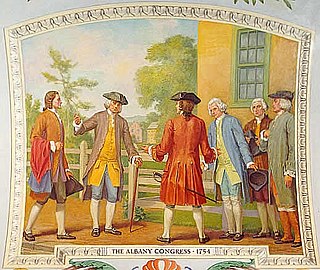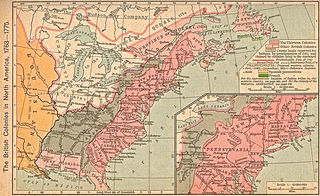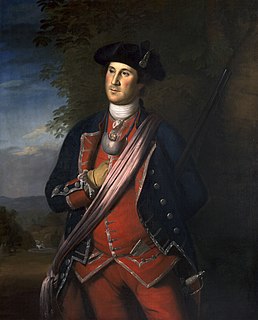
The American Revolution was a colonial revolt that took place between 1765 and 1783. The American Patriots in the Thirteen Colonies won independence from Great Britain, becoming the United States of America. They defeated the British in the American Revolutionary War (1775–1783) in alliance with France and others.

The Stamp Act of 1765 was an Act of the Parliament of Great Britain that imposed a direct tax on the British colonies and plantations in America and required that many printed materials in the colonies be produced on stamped paper produced in London, carrying an embossed revenue stamp. Printed materials included legal documents, magazines, playing cards, newspapers, and many other types of paper used throughout the colonies. Like previous taxes, the stamp tax had to be paid in valid British currency, not in colonial paper money.

The Navigation Acts, or more broadly The Acts of Trade and Navigation were a long series of English laws that developed, promoted, and regulated English ships, shipping, trade, and commerce between other countries and with its own colonies. The laws also regulated England's fisheries and restricted foreigners' participation in its colonial trade. While based on earlier precedents, they were first enacted in 1651 under the Commonwealth. The system was reenacted and broadened with the restoration by the Act of 1660, and further developed and tightened by the Navigation Acts of 1663, 1673, and 1696. Upon this basis during the 18th century, the acts were modified by subsequent amendments, changes, and the addition of enforcement mechanisms and staff. Additionally, a major change in the very purpose of the acts in the 1760s — that of generating a colonial revenue, rather than only regulating the Empire's trade — would help lead to revolutionary events, and major changes in implementation of the acts themselves. The Acts generally prohibited the use of foreign ships, required the employment of English and colonial mariners for three quarters of the crews, including East India Company ships. The acts prohibited the colonies from exporting specific, enumerated, products to countries and colonies other than those British, and mandated that imports be sourced only through Britain. Overall, the Acts formed the basis for English British overseas trade for nearly 200 years, but with the development and gradual acceptance of free trade, the acts were eventually repealed in 1849. The laws reflected the European economic theory of mercantilism which sought to keep all the benefits of trade inside their respective Empires, and to minimize the loss of gold and silver, or profits, to foreigners through purchases and trade. The system would develop with the colonies supplying raw materials for British industry, and in exchange for this guaranteed market, the colonies would purchase manufactured goods from or through Britain.

The Albany Congress was a meeting of representatives sent by the legislatures of seven of the thirteen British colonies in British America: Connecticut, Maryland, Massachusetts, New Hampshire, New York, Pennsylvania, and Rhode Island. Northernmost Newfoundland and Nova Scotia were not in attendance. Representatives met daily at the Stadt Huys in Albany, New York, from June 18 to July 11, 1754, to discuss better relations with the American Indian tribes and common defensive measures against the French threat from Canada in the opening stage of the French and Indian War, the North American front of the Seven Years' War between Great Britain and France.

The colonial history of the United States covers the history of European colonization of America from the early 16th century until the incorporation of the colonies into the United States of America. In the late 16th century, England, France, Spain, and the Netherlands launched major colonization programs in America. The death rate was very high among those who arrived first, and some early attempts disappeared altogether, such as the English Lost Colony of Roanoke. Nevertheless, successful colonies were established within several decades.

The Intolerable Acts were punitive laws passed by the British Parliament in 1774 after the Boston Tea Party. The laws were meant to punish the Massachusetts colonists for their defiance in the Tea Party protest in reaction to changes in taxation by the British to the detriment of colonial goods. In Great Britain, these laws were referred to as the Coercive Acts.

Sharecropping is a form of agriculture in which a landowner allows a tenant to use the land in return for a share of the crops produced on their portion of land. Sharecropping has a long history and there are a wide range of different situations and types of agreements that have used a form of the system. Some are governed by tradition, and others by law. Legal contract systems such as the Italian mezzadria, the French métayage, the Spanish mediero, the Slavic połowcy,издoльщина or the Islamic system of muqasat, occur widely.

The Sons of Liberty was a secret organization that was created in the Thirteen American Colonies to advance the rights of the European colonists and to fight taxation by the British government. It played a major role in most colonies in battling the Stamp Act in 1765. The group officially disbanded after the Stamp Act was repealed. However, the name was applied to other local separatist groups during the years preceding the American Revolution.

The Townshend Acts were a series of British Acts of Parliament passed during 1767 and 1768 and relating to the British in North America. The acts are named after Charles Townshend, the Chancellor of the Exchequer, who proposed the program. Historians vary slightly as to which acts they include under the heading "Townshend Acts", but five acts are often mentioned:

The Currency Act is one of many several Acts of the Parliament of Great Britain that regulated paper money issued by the colonies of British America. The Acts sought to protect British merchants and creditors from being paid in depreciated colonial currency. The policy created tension between the colonies and Great Britain, and was cited as a grievance by colonists early in the American Revolution. However, the consensus view among modern economic historians and economists is that the debts owed by colonists to British merchants was not a major cause of the Revolution. In 1995, a random survey of 178 members of the Economic History Association found that 92 percent of economists and 74 percent of historians disagreed with the statement, "The debts owed by colonists to British merchants and other private citizens constituted one of the most powerful causes leading to the Revolution."

Patriots were those colonists of the Thirteen Colonies who rejected British rule during the American Revolution and declared the United States of America as an independent nation in July 1776. Their decision was based on the political philosophy of republicanism as expressed by spokesmen such as Thomas Jefferson, John Adams, and Thomas Paine. They were opposed by the Loyalists who supported continued British rule.

Slavery in the British and French Caribbean refers to slavery in the parts of the Caribbean dominated by France or the British Empire.
The Revolt of the Comuneros was a popular uprising in the Viceroyalty of New Granada against the Spanish authorities from March through October 1781. The revolt was in reaction to the increase in taxation to raise funds for defense of the region against the British, a rise in the price of tobacco and brandy, which were part of the late eighteenth-century Bourbon reforms. The initial revolt was local and not well known outside the region of Socorro, but in the late nineteenth century, historian Manuel Briceño saw the massive revolt as a precursor to independence. Prior to the 1781 revolt, residents in New Granada had protested, at times violently, crown policy implementation there between 1740 and 1779.
Steven Ng-Sheong Cheung is a Hong-Kong-born American economist who specializes in the fields of transaction costs and property rights, following the approach of new institutional economics. He achieved his public fame with an economic analysis on China open-door policy after the 1980s. In his studies of economics, he focuses on economic explanation that is based on real world observation. He is also the first to introduce concepts from the Chicago School of Economics, especially price theory, into China. In 2016, Cheung claimed to have written "1,500 articles and 20 books in Chinese" during his academic career.
The history of New England pertains to the New England region of North America in the United States. New England is the oldest clearly defined region of the United States, and it predates the American Revolution by more than 150 years. The English Pilgrims were Puritans fleeing religious persecution in England who established Plymouth Colony in 1620, the first colony in New England and second in America. A large influx of Puritans populated the greater region during the Puritan migration to New England (1620–1640), largely in the Boston and Salem area. Farming, fishing, and lumbering prospered, as did whaling and sea trading.

The Molasses Act of March 1733 was an Act of the Parliament of Great Britain, which imposed a tax of six pence per gallon on imports of molasses from non-English colonies. Parliament created the act largely at the insistence of large plantation owners in the British West Indies. The Act was not passed for the purpose of raising revenue, but rather to regulate trade by making British products cheaper than those from the French West Indies. The Molasses Act greatly affected the significant colonial molasses trade.

The cuisine of the Thirteen Colonies includes the foods, bread, eating habits, and cooking methods of the Colonial United States.
The American Revolutionary War inflicted great financial costs on all of the combatants, including the United States of America, France, Spain and Great Britain. France and Great Britain spent 1.3 billion livres and 250 million pounds, respectively. The United States spent $400 million in wages for its troops. Spain increased its military spending from 454 million reales in 1778 to over 700 million reales in 1779.
Peasant economics is an area of economics in which a wide variety of economic approaches ranging from the neoclassical to the marxist are used to examine the political economy of the peasantry. The defining feature of the peasants are that they are typically seen to be only partly integrated into the market economy - an economy which, in societies with a significant peasant population, is typically found to have many imperfect, incomplete or missing markets. Peasant economics treats peasants as something different from other farmers as they are not assumed to be simply small profit maximizing farmers; by contrast, peasant economics covers a wide range of different theories of peasant household behavior. These include various assumptions about the maximization of profits, risk aversion, drudgery aversion, and sharecropping. The assumptions, logic, and predictions of these theories are examined and the impact of subsistence is typically found to have important implications in terms of producers decisions about supply, consumption and price. Chayanov was an early proponent of the importance of understanding peasant behaviour arguing that peasants would work as hard as they needed in order to meet their subsistence needs, but had no incentive beyond those needs and therefore would slow and stop working once they were met. This principle, the consumption-labour-balance principle, implies that the peasant household will increase its work until it meets (balances) the needs (consumption) of the household. A possible implication of this view of peasant societies is that they will not develop without some external, added factor. Peasant economics has been seen as being an important area of study by some development economists, agricultural sociologists, and anthropologists.














